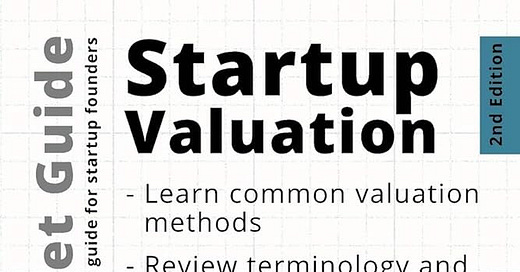Startup Valuation: How to Do It!
This Friday -> "Founder’s Pocket Guide: Startup Valuation" by Stephen R. Poland [3 min reading]
Hey, it’s Fede!
Psss: Before we begin, I’ll deliver a newsletter about deep working next week. It’s turning out very interesting. Stay tuned!
This week, we’re diving into a topic that often feels like a lottery: Startup Valuation.
To be honest, valuing a startup isn’t pure science. There are long, complex formulas out there, but for early-stage startups, you can get most of what you need from this compact book: "Founder’s Pocket Guide: Startup Valuation" by Stephen R. Poland.
First, keep in mind these three rules:
Your startup is worth whatever you and your investor agree it’s worth.
Until you’re raising an equity round, don’t think about it.
Combine multiple valuation methods to reduce errors.
Before jumping into methods, make sure you understand pre-money vs. post-money valuation (check here) and liquidation preferences (check here), These are the basics.
Market Comp Valuation
One of the easiest and most versatile methods is comparing your startup to similar ones that recently closed a financing round.
Here’s how this method works:
List your startup’s key features like industry, team, location, technology, USP, etc.
Search platforms like Crunchbase to find startups with similar characteristics.
You won’t find an exact match, but comparing several startups with partial similarities gives you a great benchmark.
Why It Works: Investors love comparisons. Showing them other deals helps prove your valuation and makes it more believable, especially if they’re in the same sector and region.
Step-Up Valuation Method
This method is quick but very rigid. It’s ok if you need a rough idea of a SaaS project for example. The concept is simple:
There are 10 key factors, each worth CHF 250k.
For every box you check, your valuation goes up.
The Checklist:
Total market size over CHF 500M.
Scalable business model.
Founders with past exits or strong sector expertise.
More than one co-founder is fully committed.
MVP developed.
Paying customers validates the business model.
Key partnerships secured.
Solid business plan.
Intellectual property (IP) in place.
Strong unique selling proposition (USP).
If your project has 5 of these points: 5 x 250k = 1’750’000 CHF of valuation.
My suggestion is to adjust the value of each point slightly based on how important you think they are for your startup.
Risk Mitigation Valuation
This method breaks your startup into four categories:
Technology: Any tech achievements, like a validated prototype or patents.
Market: Proven demand or early traction.
Execution: Team expertise and operational milestones.
Capital: Funding raised or significant savings.
Each category needs to be populated with your startup’s achievements.
For example:
“Our MVP was developed in 12 months so it is worth CHF 200k” This would go under Technology.
Then, add up all four points and calculate the total.
Why It’s Powerful: It allows you to justify your valuation point by point, giving investors confidence in your numbers.
What About Traditional Methods?
Methods like Discounted Cash Flow (DCF) work well for established businesses but fall short for early-stage startups. Why? Early-stage startups have no track record and rely heavily on projections.
It’s better to focus on tangible achievements and market comparisons.
PS: Timing is one of the most crucial factors for a startup. The ability to deliver well and fast thanks to the deep work will be the topic of next week, don’t miss it, it’s going to be awesome!
See you next Friday,
Federico Lorenzon









